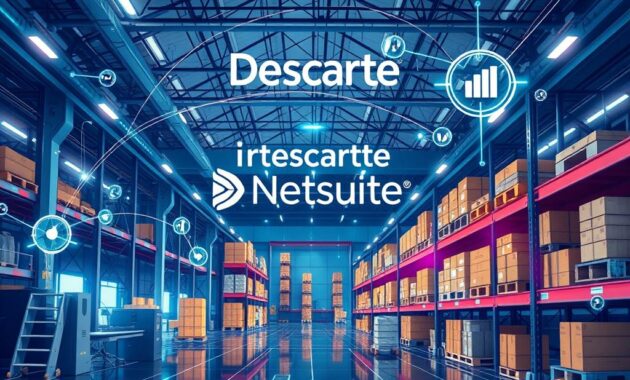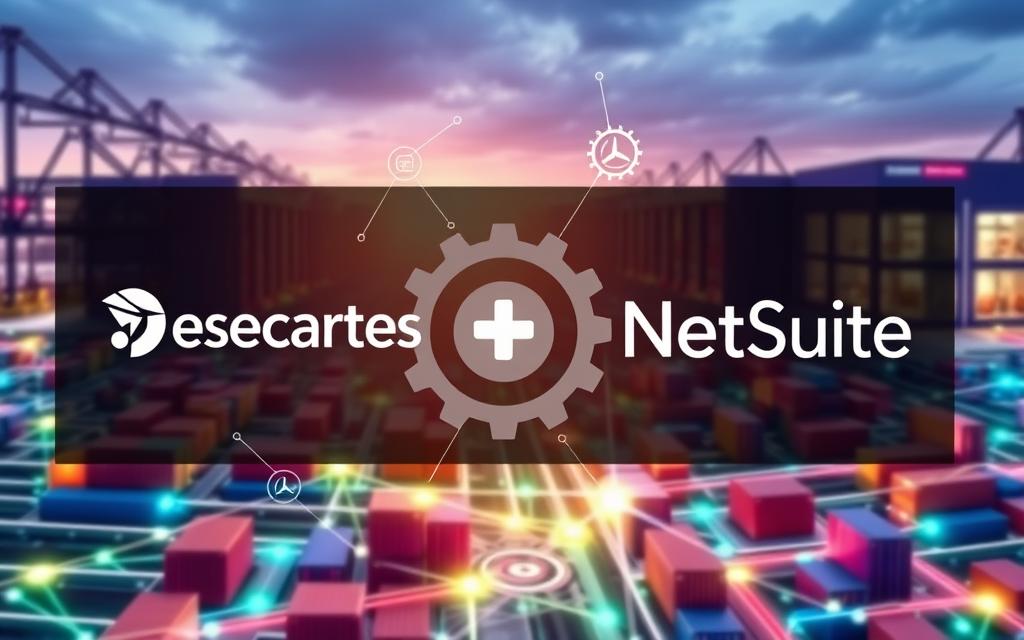In the current era of rapid commercial evolution, the imperative for logistics optimization to sustain competitive superiority is paramount. The integration of Descartes NetSuite empowers you to tap into the latest technological advancements, thereby optimizing your operational processes and elevating supply chain efficacy. This synergy enables the utilization of actionable data, the refinement of operational workflows, and the diminution of costs. As you delve into the interplay between these platforms, your enterprise will be poised for enduring growth and triumph.
Understanding the Benefits of Descartes NetSuite Integration
The synergy between Descartes and NetSuite heralds a new era for businesses aiming to refine their supply chain management. This collaboration enables a significant leap in operational efficiency. It equips enterprises with sophisticated tools to demystify intricate processes, thereby boosting productivity across diverse supply chains.
Streamlining Your Supply Chain Management
This integration empowers businesses to streamline their supply chain management with unparalleled efficiency. Leveraging cutting-edge software, essential tasks are automated, thereby reducing manual intervention and diminishing error rates. This synergy culminates in enhanced productivity. Companies can anticipate:
- Improved order processing times
- Faster invoice generation
- Higher levels of customer satisfaction
Enhancing Visibility Across Your Operations
Operational visibility emerges as a pivotal advantage. It affords real-time access to shipment statuses and inventory levels, facilitating swift decision-making and adaptability to market fluctuations. The benefits are manifold:
- Tighter control over inventory management
- Proactive issue resolution
- Better alignment with suppliers and partners
Key Features of Descartes NetSuite Integration
The synergy between Descartes and NetSuite unveils a suite of features, meticulously crafted to revolutionize logistics operations. These elements not only amplify operational efficiency but also furnish profound insights, empowering you to execute decisions that propel your enterprise’s trajectory.
Real-Time Tracking Capabilities
The integration’s cornerstone is the real-time tracking functionality. It affords instantaneous updates on inventory and shipment statuses. This capability empowers you to monitor shipments in real-time, receiving prompt notifications for any disruptions. Such proactive management of logistics significantly bolsters reliability and customer satisfaction.
Automated Reporting Tools
The automated reporting functionalities are instrumental in streamlining logistics workflows. These tools expedite data aggregation and analysis, facilitating the creation of detailed reports with minimal effort. This automation reduces manual inaccuracies, freeing your team to concentrate on tasks that contribute to strategic growth.
Advanced Analytics for Better Decision-Making
By harnessing data analytics, you can extract valuable insights from your logistics data. Descartes’ analytics capabilities unveil patterns and trends within your supply chain, facilitating more informed strategic decisions. This depth of understanding equips your organization to refine operations, thereby strengthening your market position.
| Feature | Description | Benefits |
|---|---|---|
| Real-Time Tracking | Instant updates on shipment and inventory statuses. | Improves reliability and customer satisfaction. |
| Automated Reporting | Streamlined data collection for report generation. | Reduces manual errors and saves time. |
| Advanced Analytics | In-depth analysis of logistics data. | Informs strategic decisions and optimizes operations. |
How to Implement Descartes NetSuite Integration
The process of integrating Descartes NetSuite necessitates meticulous planning and precise execution. Initiate by conducting an exhaustive logistics evaluation to discern your prevailing operational paradigms. This evaluation is pivotal in identifying areas ripe for enhancement, thereby facilitating a more seamless integration process. Subsequently, select Descartes solutions that resonate with your strategic objectives, ensuring they are congruent with your specific business requisites. Ultimately, adhere to a methodically outlined implementation protocol to optimize the efficacy of your integration endeavors.
Assessing Your Current Logistics Processes
Initiate by meticulously scrutinizing your extant logistics frameworks. This entails a comprehensive examination of various facets, including:
- Current software and tools in use
- Data flow between systems
- Efficiency of inventory management
- Communication with suppliers and partners
Recognizing inefficiencies in these domains is imperative for a successful integration implementation.
Choosing the Right Descartes Solutions
Post-assessment, concentrate on selecting Descartes solutions that are most congruent with your organizational needs. Considerations should encompass:
- Compatibility with existing systems
- Scalability to accommodate future growth
- Features and functionalities pertinent to your industry
Opting for the appropriate solutions ensures that your integration fulfills both immediate operational necessities and long-term business aspirations.
Step-by-Step Implementation Guide
A meticulously structured implementation strategy is crucial for success. Adhere to these pivotal steps:
- Develop a detailed project plan delineating objectives and timelines.
- Engage stakeholders to ensure comprehensive support for the project.
- Establish the requisite technical infrastructure for the integration.
- Conduct a pilot test to uncover potential issues prior to full deployment.
- Launch the integration and continuously monitor its performance for necessary adjustments.
Adherence to this step-by-step guide can significantly expedite the integration process with Descartes solutions, thereby enhancing your logistics operations.
Cost Considerations with Descartes NetSuite
Delving into the financial implications of integrating Descartes NetSuite is imperative for any enterprise. This discourse focuses on pivotal strategies for budgeting logistics, evaluating costs, and assessing investment returns. It is essential to consider both initial expenditures and ongoing operational costs to make informed decisions regarding the cost of integration.
Budgeting for Integration
Initiating the integration of Descartes with NetSuite necessitates the creation of a detailed budget. It is imperative to account for various factors, including software licensing, installation, and training costs. By segmenting expenses into manageable categories, one gains a clear understanding of the financial commitment required for a successful integration.
- Software Licenses: Understand the cost of the required licenses based on your business size and needs.
- Implementation Services: Consider expenses related to consulting and technical support during the integration process.
- Training Programs: Allocate a budget for educating your staff on the new systems to maximize functionality.
- Ongoing Maintenance: Factor in ongoing operational costs such as system updates and additional support.
Evaluating Return on Investment
An effective ROI assessment follows budgeting efforts. It is crucial to project the financial benefits resulting from the integration, which may include improved efficiencies and cost savings across your supply chain. To facilitate this process, consider the following methods for calculating your potential ROI:
- Increase in Efficiency: Quantify how much time and resources you save by streamlining operations.
- Reduction of Errors: Assess financial savings resulting from fewer mistakes and less rework.
- Enhanced Customer Satisfaction: Consider potential revenue increases driven by improved service levels.
- Long-Term Strategic Gains: Evaluate how integration positions your business for future growth and scalability.
Overcoming Common Integration Challenges
The integration of systems such as Descartes with NetSuite entails navigating through a myriad of obstacles. Chief among these are the complexities of data compatibility and the imperative of achieving user adoption among the workforce. Successfully addressing these challenges can facilitate a seamless transition, thereby boosting overall productivity.
Addressing Data Compatibility Issues
Data compatibility issues often emerge as a significant barrier during system integration. The discrepancies in data formats or structures between different systems can be particularly problematic. To overcome these hurdles, several strategies can be employed:
- Conduct a thorough data audit: Prior to integration, it is essential to evaluate the existing data types and formats in both systems.
- Standardize data formats: Establishing a uniform format for data entry and storage can streamline the integration process.
- Utilize middleware: Middleware solutions can facilitate data flow and communication between systems, enhancing integration efficiency.
- Test the integration: Extensive testing with diverse data sets is crucial to identify and resolve compatibility issues before full implementation.
Ensuring User Adoption Among Staff
User adoption is paramount for the success of any integration. Employees may be hesitant to adapt due to unfamiliarity or lack of understanding. To promote user adoption, several strategies can be employed:
- Provide comprehensive training: Training sessions that elucidate new functionalities and enhance user experience are indispensable.
- Encourage feedback: Establishing an open channel for staff to voice concerns or suggestions regarding the new system is vital.
- Foster a supportive environment: Cultivating a culture that welcomes technological advancements and emphasizes the benefits of new systems is crucial.
- Highlight success stories: Sharing early achievements and efficient workflows resulting from the integration can motivate staff.
Best Practices for Workflow Optimization
Optimizing logistics workflows necessitates the adoption of several pivotal practices, significantly boosting efficiency and productivity. Tailored solutions are imperative to ensure that systems are meticulously aligned with the specific business requirements. Integration updates, on a regular basis, are critical for maintaining these systems, enabling adaptability in the rapidly evolving logistics landscape.
Tailoring Solutions to Your Business Needs
Every enterprise possesses distinct requirements, rendering generic solutions ineffective. To achieve optimal workflow optimization, consider the following:
- Assess Your Current Processes: Identify inefficiencies and areas for improvement.
- Define Specific Goals: Establish clear objectives for what you want to achieve with the integration.
- Choose Compatible Tools: Select software that complements existing systems for seamless integration.
- Engage Stakeholders: Involve key team members in the planning and implementation phases to ensure buy-in and relevancy.
Regularly Updating Your Integration Setup
Staying abreast of technological advancements is crucial for workflow optimization. Regular updates can significantly enhance your integration. Consider these recommendations:
- Schedule Routine Reviews: Assess system performance and identify areas for enhancement.
- Stay Informed on New Features: Keep track of advancements in Descartes solutions and NetSuite functionalities.
- Implement Feedback Loops: Gather feedback from team members to identify issues and streamline processes.
- Upgrade As Necessary: Don’t hesitate to adopt new technologies that can enhance your operations.

By integrating these best practices into your logistics operations, you can develop customized solutions that evolve with your business, maximizing the benefits of integration updates. This proactive strategy not only enhances efficiency but also positions your organization for sustained success in the logistics sector.
Training Your Team on Descartes NetSuite
The integration of Descartes NetSuite necessitates a robust training regimen for your team. It is imperative to equip your personnel with the requisite competencies to harness the software’s full potential. By crafting exhaustive training modules, you can imbue your workforce with the proficiency to navigate the system adeptly and with assurance.
Developing Comprehensive Training Programs
Customized training initiatives should concentrate on the core functionalities of Descartes NetSuite, tailored to your organization’s unique requirements. A methodical approach is crucial for enhancing comprehension and operational proficiency. When designing your training, consider the following critical aspects:
- Hands-on workshops that provide real-life scenarios for practical experience.
- User manuals and resources that can be easily accessed for ongoing reference.
- Interactive sessions encouraging collaboration among team members to foster group learning.
Continuous Support and Learning Opportunities
Post-training, the imperative of continuous learning for team proficiency cannot be overstated. Establishing support channels is essential for fostering a culture of development. This can be achieved through:
- Providing mentorship programs for ongoing guidance.
- Implementing regular feedback loops to identify areas for improvement.
- Offering refresher courses to keep skills current and relevant.
Measuring Success After Integration
Assessing the efficacy of your Descartes NetSuite integration is paramount for sustained enhancement. The establishment of pivotal performance indicators serves as a blueprint for scrutinizing logistics methodologies. The deployment of efficacious assessment tools facilitates the acquisition of pertinent data, thereby empowering informed operational decisions.
Key Performance Indicators to Monitor
Choosing the appropriate performance indicators is crucial for evaluating both operational efficacy and customer contentment. Consideration should be given to the following metrics:
- Order Fulfillment Rate: Quantifies the proportion of orders dispatched punctually.
- Inventory Turnover: Reveals the frequency of inventory turnover over a specified timeframe.
- Shipping Accuracy: Monitors the precision of shipped items vis-à-vis orders.
- Cost per Order: Demonstrates the aggregate logistics expenditures divided by the volume of orders processed.
- Customer Satisfaction Score: Evaluates customer sentiment towards your fulfillment services.
Tools and Techniques for Effective Assessment
Utilizing optimal assessment tools significantly augments your capacity for dissecting performance metrics. The following methodologies are recommended:
- Data Analytics Software: Utilize platforms such as Tableau or Power BI to efficiently depict performance data.
- Surveys and Feedback Forms: Solicit direct feedback from customers regarding their interactions with your services.
- Benchmarking: Compare your performance metrics against industry benchmarks to discern areas for improvement.
Case Studies: Success Stories with Descartes NetSuite Integration
An examination of real-world applications of Descartes NetSuite integration unveils compelling success narratives, each highlighting concrete achievements. Through these case studies, one can discern the strategic approaches adopted by industry pioneers. These narratives offer invaluable insights into optimizing logistics and achieving operational superiority.
Real-World Applications and Outcomes
Across diverse sectors, numerous enterprises have integrated Descartes NetSuite, witnessing substantial performance enhancements. Below are some exemplary instances:
| Company | Industry | Outcome | Key Achievement |
|---|---|---|---|
| Company A | Retail | 30% reduction in delivery times | Improved customer satisfaction scores |
| Company B | Manufacturing | 25% decrease in inventory costs | Streamlined supply chain processes |
| Company C | Food & Beverage | 40% enhancement in order accuracy | Boosted sales through better service |
Lessons Learned from Industry Leaders
Each case study imparts unique industry wisdom, guiding your integration endeavors. Key insights include:
- Investing in robust training ensures successful user adoption.
- Regularly assess and update integration strategies to keep pace with market changes.
- Utilizing real-time tracking significantly enhances operational transparency.
- Collaborating with experienced providers accelerates implementation and minimizes disruptions.

The Future of Logistics Technology
The trajectory of logistics is being reshaped by an avalanche of technological breakthroughs and innovations. To remain competitive, it is imperative for enterprises to stay abreast of the latest logistics technology trends. The integration of automation, artificial intelligence, and data analytics is transforming the sector, leading to enhanced operational efficiency, cost reduction, and superior service quality. By embracing these cutting-edge technologies, your organization can position itself for enduring success amidst the dynamic shifts in the logistics industry.
Trends Shaping the Logistics Landscape
Several pivotal trends are presently molding the logistics domain. The exponential growth of e-commerce has significantly altered consumer expectations, demanding swifter and more dependable delivery services. Moreover, the advent of transportation technologies such as autonomous vehicles and drone delivery systems is transforming last-mile logistics. Sustainability is another critical trend, with companies adopting environmentally friendly practices to minimize their carbon footprint and meet the growing demand for eco-conscious options.
How Descartes and NetSuite Stay Ahead of the Curve
Descartes and NetSuite are at the forefront of innovation, recognizing the evolving landscape of logistics. Through the integration of advanced solutions, these platforms enable you to navigate the complexities of logistics technology trends and maintain a competitive edge. Their sophisticated analytics capabilities offer deep insights into your operational performance, facilitating data-driven decision-making that directly influences your financial outcomes. As you navigate the ever-changing logistics landscape, leveraging the capabilities of these powerful solutions will be instrumental in driving your long-term market innovation strategies.



